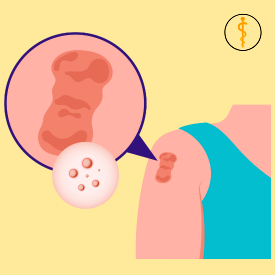Cyst Removal (Ovarian Cystectomy)

An ovarian cystectomy is a surgical procedure aimed at removing ovarian cysts, which are fluid-filled sacs that can develop on the ovaries. While these cysts are common and often resolve independently without treatment, your healthcare provider may recommend a cystectomy if the cyst persists, enlarges, or causes discomfort.
There are two primary approaches to performing an ovarian cystectomy:
This minimally invasive technique involves the insertion of a laparoscope— a small camera equipped with a light— through a tiny incision in your abdomen. This allows the surgeon to visualize the reproductive and pelvic organs. Additional small incisions are made to introduce surgical instruments to remove the cyst.
In cases where the cyst is particularly large or there are concerns about cancer, a larger incision is made in the abdomen to facilitate the removal of the cyst.
Laparoscopic cystectomy is preferred due to its minimally invasive nature, which promotes a quicker recovery compared to open surgery. However, open surgery may be necessary for larger cysts or suspected malignancy.
Ovarian cysts can arise from various conditions, including:
While many ovarian cysts are harmless and resolve on their own, surgical intervention may be required if:
Dr. Mohit Agrawal will assess your condition and determine if an ovarian cystectomy is the best course of action for your health.
Preparation for an ovarian cystectomy involves following your surgeon’s pre-operative instructions, including dietary restrictions and medication management.
During the procedure, you will be placed under general anesthesia. For laparoscopic cystectomy, your surgeon will create a few small incisions in your abdomen, inflate the area for better visibility, and remove the cyst using specialized instruments. If open surgery is necessary, a larger incision will be made for direct access to the cyst.
Post-surgery, you will be monitored in a recovery room. Depending on the type of surgery, your recovery time can vary:
Your surgeon will provide specific post-operative care instructions, including activity restrictions, pain management, and follow-up appointments.
The primary benefit of an ovarian cystectomy is the removal of potentially harmful or painful cysts. However, like all surgical procedures, there are risks involved, such as infection, bleeding, and injury to surrounding tissues. Discuss these risks thoroughly with Dr. Agrawal to ensure you are fully informed.
An ovarian cystectomy does not inherently affect your fertility. However, underlying conditions causing the cysts may influence your ability to conceive. If you have concerns regarding fertility, Dr. Agrawal can provide insights tailored to your situation.
If you experience symptoms such as increased pain, unusual bleeding, or signs of infection following your cystectomy, contact Dr. Mohit Agrawal promptly for evaluation.
An ovarian cystectomy can be a critical procedure for managing ovarian cysts that pose a risk to your health. If you’re experiencing symptoms or have concerns about ovarian cysts, schedule a consultation with Dr. Mohit Agrawal to explore your treatment options and receive expert care.
An ovarian cyst is a fluid-filled sac that develops on or inside an ovary. Most ovarian cysts are benign (non-cancerous) and may resolve on their own, but some require medical intervention.
Removal is recommended if the cyst is:
1) Large or growing
2) Causing severe pain or discomfort
3) Suspected to be cancerous
4) Affecting fertility or causing complications like torsion or rupture.
Common symptoms include:
1) Pelvic pain or pressure
2) Bloating or abdominal discomfort
3) Irregular menstrual cycles
4) Pain during intercourse
5) Difficulty emptying the bladder
Yes, some cysts can be managed with medications like hormonal therapy (birth control pills) or monitored over time with regular ultrasounds. Surgery is only needed for complex or symptomatic cysts.
An ovarian cystectomy is a surgical procedure to remove an ovarian cyst while preserving the healthy ovarian tissue.
There are two main types:
1) Laparoscopic Surgery: A minimally invasive procedure using small incisions and a camera for guidance.
2) Open Surgery (Laparotomy): Performed through a larger abdominal incision, usually for larger or suspicious cysts.
Benefits include:
1) Smaller incisions and minimal scarring
2) Faster recovery time
3) Less pain and shorter hospital stay
The surgery is performed under anesthesia, so you won’t feel pain during the procedure. Some post-surgical discomfort is normal and can be managed with pain medications.
Laparoscopic cystectomy usually takes about 1-2 hours, while open surgery may take longer depending on the complexity of the case.
Recovery time depends on the type of surgery:
1) Laparoscopic surgery: 1-2 weeks
2) Open surgery: 4-6 weeks
1) Avoid strenuous activities or heavy lifting for a few weeks.
2) Follow a healthy diet to aid healing.
3) Attend follow-up appointments to monitor recovery.
4) Take medications as prescribed and follow your doctor’s care instructions.
Yes, most women can conceive after cyst removal. The surgery often preserves ovarian function, and in some cases, it may even improve fertility if the cyst is causing hormonal imbalance or other complications.
While the surgery is generally safe, potential risks include:
1) Infection
2) Bleeding
3) Injury to surrounding organs
4) Scar tissue formation (adhesions)
5) Rarely, recurrence of the cyst
The cost varies based on the type of surgery, hospital, and surgeon’s expertise:
1) Laparoscopic surgery: ₹60,000 to ₹1,50,000
2) Open surgery: ₹80,000 to ₹2,50,000
Yes, most health insurance policies cover ovarian cyst removal if it is deemed medically necessary. However, it’s advisable to check with your insurance provider for details.
Mumbai is known for its advanced medical facilities, experienced gynecologists, and laparoscopic surgeons. The city offers high-quality care at competitive prices, with access to state-of-the-art technology and minimally invasive surgical techniques.
Ready to take the next step towards expert and personalized care for Cyst Removal (Ovarian Cystectomy)?
Contact us today to schedule your consultation. Our experienced Cyst Removal (Ovarian Cystectomy) team is here to provide expert guidance and ensure your comfort throughout the process.